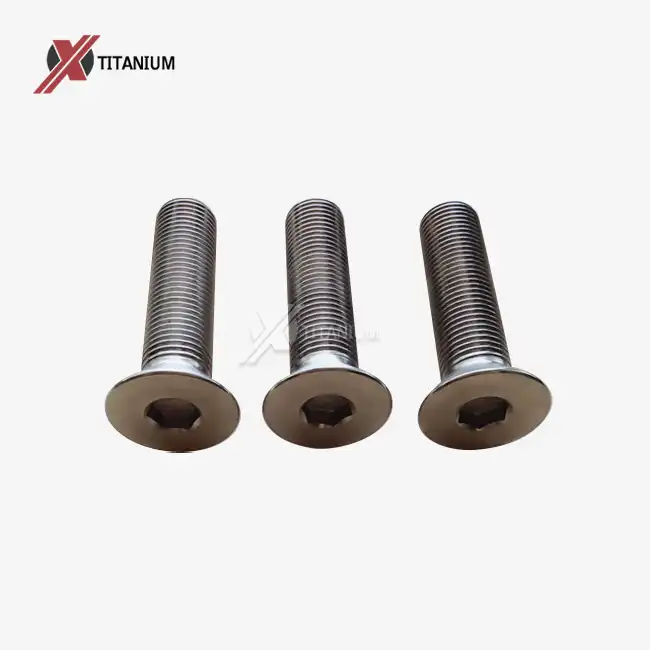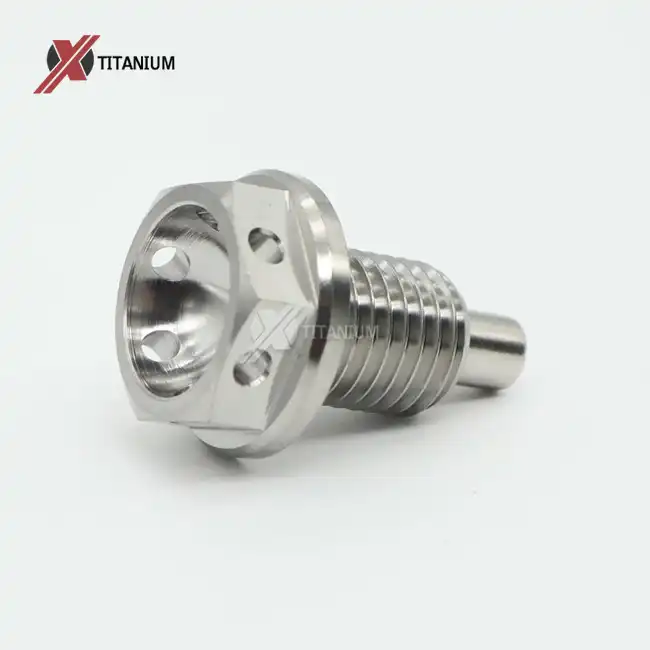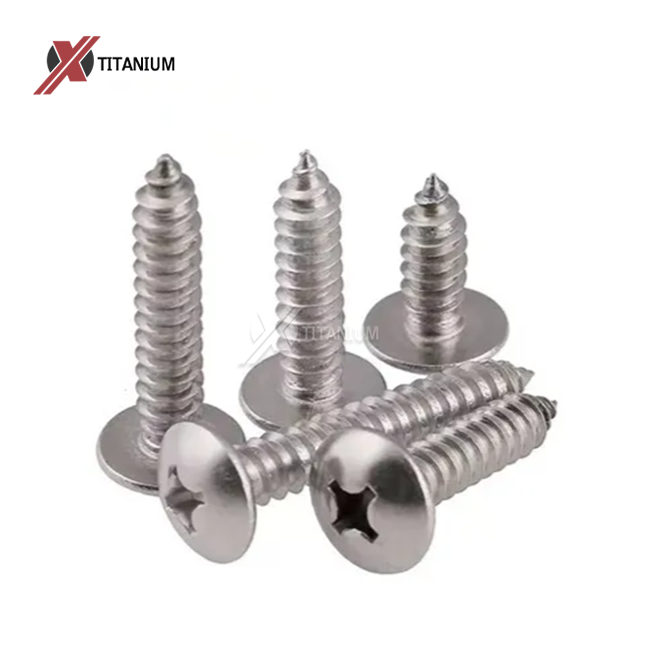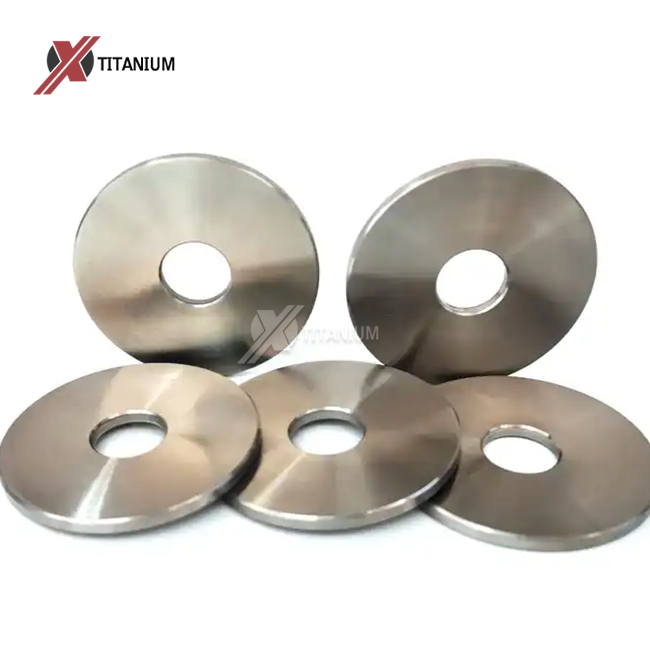When selecting between Grade 2 and Grade 5 titanium fasteners, understanding their fundamental differences becomes crucial for optimal performance. Grade 2 represents commercially pure titanium with excellent corrosion resistance, while Grade 5 (Ti-6Al-4V) titanium alloy bolts offer superior strength through aluminum and vanadium alloying. The primary distinction lies in mechanical properties: Grade 5 delivers nearly double the tensile strength at 895-930 MPa compared to Grade 2's 345-483 MPa, making Grade 5 titanium bolts the preferred choice for high-stress aerospace fasteners and demanding structural applications.
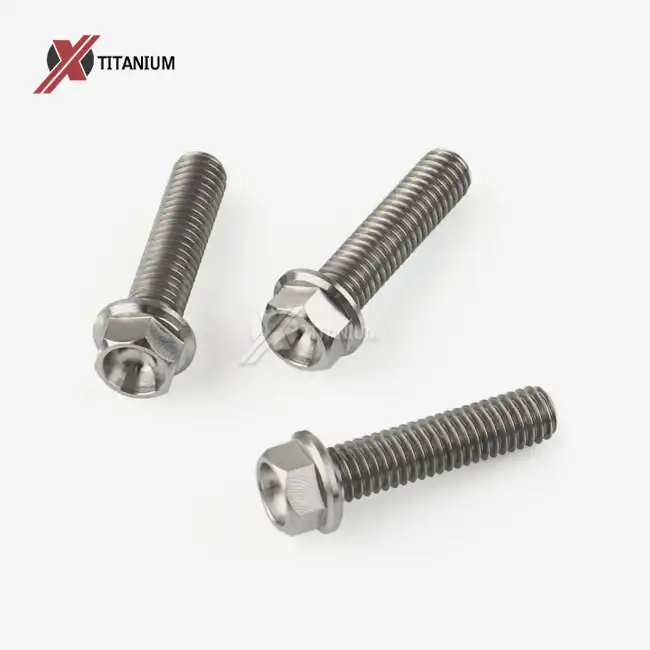
Understanding Titanium Grades: Material Composition and Properties
The titanium industry categorizes materials based on purity levels and alloying elements. Grade 2 titanium maintains 99.2% minimum titanium content with trace amounts of oxygen, iron, and nitrogen. This composition delivers exceptional biocompatibility and corrosion resistance across diverse environments.
Grade 5 titanium incorporates 6% aluminum and 4% vanadium, creating a significantly different material profile. The aluminum content reduces density while enhancing strength, and vanadium stabilizes the beta phase structure. This alloy composition results in superior mechanical properties suitable for precision engineering applications.
Key compositional differences include:
1. Oxygen content: Grade 2 allows up to 0.25%, while Grade 5 permits 0.20%
2. Iron content: Both grades maintain similar iron limits around 0.30%
3. Alloying elements: Grade 5 exclusively contains aluminum and vanadium additions
If you need maximum corrosion resistance for chemical processing equipment, then Grade 2 proves more suitable. If you require high strength-to-weight ratios for aerospace applications, then Grade 5 becomes the optimal choice.
Mechanical Properties Comparison: Strength and Performance Data
Laboratory testing reveals significant mechanical property variations between these titanium grades. Grade 5 demonstrates superior performance across multiple strength parameters, while Grade 2 excels in ductility and formability characteristics.
| Property | Grade 2 | Grade 5 |
|---|---|---|
| Tensile Strength (MPa) | 345-483 | 895-930 |
| Yield Strength (MPa) | 275-414 | 828-869 |
| Elongation (%) | 20-30 | 10-15 |
| Modulus of Elasticity (GPa) | 103 | 114 |
The load-bearing capacity difference becomes particularly pronounced under dynamic loading conditions. Grade 5 titanium alloy bolts withstand fatigue cycles exceeding 10^7 cycles at stress levels around 500 MPa, while Grade 2 typically handles 300 MPa under similar conditions.
Heat resistance properties also vary considerably. Grade 5 maintains structural integrity at temperatures reaching 400°C, whereas Grade 2 begins showing property degradation beyond 300°C. This temperature differential influences material selection for high-temperature industrial applications.
If you need fasteners for medical implants requiring excellent biocompatibility, then Grade 2 offers superior performance. If you require fasteners for jet engine components experiencing extreme stress, then Grade 5 provides necessary strength characteristics.
Application-Specific Performance in Critical Industries
Aerospace fasteners demand exceptional performance under extreme conditions. Grade 5 titanium dominates this sector due to its outstanding strength-to-weight ratio and heat resistance. Aircraft manufacturers utilize these fasteners for wing assemblies, landing gear components, and engine mounting systems.
The petrochemical industry presents different challenges emphasizing corrosion resistance over pure strength. Grade 2 titanium excels in environments containing sulfuric acid, hydrochloric acid, and seawater. Offshore platforms and chemical processing equipment benefit from Grade 2's superior environmental resistance.
Medical device applications prioritize biocompatibility and non-toxicity. Grade 2 titanium receives FDA approval for implantable devices due to its excellent tissue compatibility. Surgical instruments and orthopedic implants commonly utilize Grade 2 fasteners.
Marine engineering applications face constant saltwater exposure and mechanical stress. Both grades find applications here, with Grade 2 handling general corrosion resistance needs and Grade 5 addressing high-stress structural connections.
If you need fasteners for chemical processing equipment exposed to aggressive media, then Grade 2 delivers optimal durability. If you require aerospace fasteners supporting critical flight loads, then Grade 5 provides essential performance characteristics.
Cost Analysis and Manufacturing Considerations
Raw material costs reflect the complexity difference between these titanium grades. Grade 2 titanium alloy bolts typically costs 15-20% less than Grade 5 due to simpler processing requirements and fewer alloying elements. However, total project costs must consider performance longevity and replacement frequency.
Manufacturing processes differ significantly between grades. Grade 2 titanium exhibits superior machinability, reducing production time and tool wear. CNC machined components from Grade 2 require less specialized tooling and cutting parameters.
Grade 5 manufacturing demands more sophisticated processing techniques. The alloy's higher strength necessitates carbide tooling and optimized cutting speeds. Surface treatment options like anodizing and nitriding provide enhanced performance but increase processing costs.
Production lead times vary based on grade complexity:
1. Grade 2: Standard processing allows 2-3 week delivery schedules
2. Grade 5: Complex heat treatment extends delivery to 3-4 weeks
3. Custom specifications: Both grades require 4-6 weeks for unique geometries
If you need cost-effective fasteners for moderate-stress applications, then Grade 2 offers excellent value. If you require premium performance justifying higher investment, then Grade 5 delivers superior long-term returns.
Quality Standards and Certification Requirements
Industry standards govern titanium fastener specifications across different sectors. ASTM B348 defines composition requirements for both grades, while ASTM F467 covers fastener-specific mechanical properties. Aerospace applications additionally require AS9100 certification and strict traceability documentation.
Medical applications demand FDA compliance and ISO 13485 quality systems. Grade 2 titanium meets USP Class VI biocompatibility standards, while Grade 5 requires additional testing for medical device applications. Material certificates must include chemical analysis, mechanical testing results, and heat treatment records.
Testing protocols ensure consistent performance across production batches. Tensile testing, hardness verification, and corrosion resistance evaluation validate material properties. Non-destructive testing methods like ultrasonic inspection detect internal defects in critical applications.
Traceability systems track materials from raw ingot through final machining. Each batch receives unique identification enabling complete supply chain documentation. This traceability proves essential for aerospace and medical applications requiring failure analysis capabilities.
If you need fasteners meeting medical device regulations, then Grade 2 with proper certification ensures compliance. If you require aerospace fasteners with complete traceability, then certified Grade 5 materials provide necessary documentation.
Why Choose Chuanglian for Your Premium Titanium Alloy Bolts Requirements?
Chuanglian stands as a leading titanium alloy bolts manufacturer with over ten years of specialized experience in precision engineering applications. Our state-of-the-art facility in Baoji City, renowned as the "City of Titanium," combines advanced CNC machining capabilities with comprehensive quality control systems.
Our manufacturing advantages include:
- AS9100 and ISO9001 certified quality management systems ensuring consistent performance
- Complete material traceability from raw ingot through final inspection
- Advanced surface treatment capabilities including anodizing, nitriding, and polishing
- Custom color options: natural titanium, gold, blue, green, purple, black, and rainbow finishes
- Comprehensive testing laboratory providing mechanical property verification
We serve demanding industries including aerospace, petrochemicals, medical devices, and marine engineering. Our technical team provides expert consultation helping customers select optimal titanium grades for specific applications. Each project receives dedicated engineering support ensuring performance requirements alignment.
Production capabilities encompass both Grade 2 and Grade 5 titanium alloy bolts with custom specifications available. Our CNC machined fasteners meet the most stringent dimensional tolerances while maintaining excellent surface finishes. Quality control procedures verify every batch before shipment.
Conclusion
Selecting between Grade 2 and Grade 5 titanium fasteners requires careful consideration of application-specific requirements. Grade 2 excels in corrosion resistance and biocompatibility applications, while Grade 5 delivers superior strength for demanding structural uses. Both grades offer exceptional performance when properly matched to application needs.
Understanding mechanical properties, cost implications, and certification requirements enables informed decision-making. Working with experienced manufacturers like Chuanglian ensures access to expert guidance and consistent quality. The investment in premium titanium fasteners delivers long-term value through enhanced performance and extended service life.
Ready to discuss your titanium fastener requirements? Our experienced team stands ready to provide technical guidance and competitive quotations. Contact us at info@cltifastener.com or djy6580@aliyun.com to explore how Chuanglian's titanium alloy bolts supplier expertise can enhance your next project's success.
References
1. American Society for Testing and Materials. "Standard Specification for Titanium and Titanium Alloy Bars and Billets." ASTM International, 2021.
2. Boyer, R., Welsch, G., and Collings, E.W. "Materials Properties Handbook: Titanium Alloys." ASM International, 2019.
3. Donachie, Matthew J. "Titanium: A Technical Guide, 2nd Edition." ASM International, 2020.
4. International Organization for Standardization. "Aerospace Series - Titanium Alloy Fasteners - Technical Specification." ISO Publishing, 2022.
5. Lutjering, Gerd and Williams, James C. "Titanium: Engineering Materials and Processes." Springer-Verlag, 2018.
6. Peters, M., Kumpfert, J., Ward, C.H., and Leyens, C. "Titanium Alloys for Aerospace Applications." Advanced Engineering Materials, 2020.
